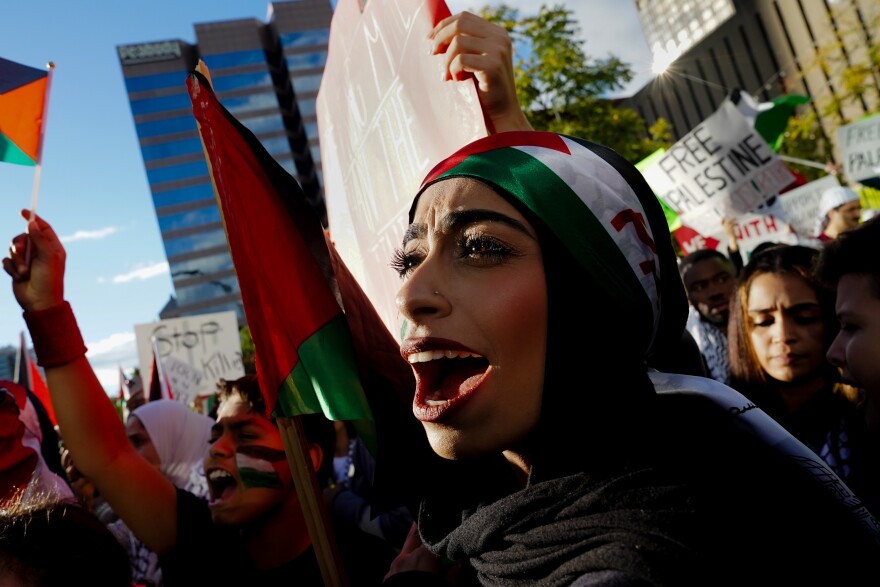Black American activists have expressed solidarity with Palestinian and Palestinian American activists in the months since the Israel-Hamas war began in October. In St. Louis, the relationship between Black and Palestinian American activists became most notable after Michael Brown Jr. — a Black teenager — was shot and killed in Ferguson by then-Ferguson police officer Darren Wilson on Aug. 9, 2014.
But the connection between the two marginalized groups started well before then — and has evolved over the decades.
Chris Tinson, history professor and chair of African American studies at St. Louis University, told St. Louis on the Air that Black activists in the U.S. noticed similarities between their efforts for liberation and civil rights with those of Palestinians in the 1950s, after the beginnings of the Arab-Israeli War of 1948.
“In particular, we're thinking about the relationship between aggrieved communities and policing institutions or state violence,” Tinson said. “Because those conditions either stay the same or worsen, it's really easy to make the parallels between those two communities who continue to bear the brunt of that kind of aggression.”

Although Black American and Palestinian activism had been connected for more than 60 years by 2014, activist Ohun Ashe admits that she was unaware of any war or shared ideals until meeting fellow protester Bassem Masri, who was Palestinian American, as well as other Palestinian activists on social media.
“Living a life as a Black American, if you are not seeking that knowledge, that knowledge isn't really given to you. [Bassem Masri] really taught us the reflection of each other's struggle [and] why it was important to amplify. And the tweets from Palestinians taught us what to do when we were hit with tear gas,” Ashe said. “It wasn't until those moments — and then looking back in history to see what James Baldwin and Angela Davis was saying — where we were even able to connect my reality to what is happening in Palestine.”
Palestinian American business owner Omar Badran has attended pro-Palestinian protests since he was a child. His parents were also part of advocacy and humanitarian efforts for Palestinian people. Like Ashe, Badran was compelled to join protests in Ferguson after Brown was killed in 2014. It was at those demonstrations where he learned more about the experiences of Black Americans and, in turn, shared his and his family’s experiences as well.
“I would talk to Black activists and learn from different activists that [there are] resources online for you to learn from,” he said. ”There's also just the real-world experiences as a person that grows up in St. Louis [who] sees the structural racism that exists to this day.”


Badran and Ashe agreed that Brown’s death, the subsequent Ferguson Uprising and the Israeli–Palestinian conflict radicalized them.
Tinson said radicalization is a contentious term that’s worth historicizing.
“When people run from the term, or when they're bothered by it, they're thinking of overthrowing everything — society just [turned] upside down. And what we're talking about is more of: What is your orientation to the world? How do you see the world? Do you see people as merely ripe for exploitation?” he said. “Do you see human brotherhood? Do you see my future in your future? These kinds of concepts [are] considered radical practice.”
For more on Black American and Palestinian activism, including discussion about anti-Black sentiments in immigrant communities, shared protest actions and how Omar Badran and Ohun Ashe see activism as business owners, listen to St. Louis on the Air on Apple Podcasts, Spotify, YouTube or click the play button below.
“St. Louis on the Air” brings you the stories of St. Louis and the people who live, work and create in our region. The show is produced by Ulaa Kuziez, Miya Norfleet, Emily Woodbury, Danny Wicentowski, Elaine Cha and Alex Heuer. Roshae Hemmings is our production assistant. The audio engineer is Aaron Doerr.







